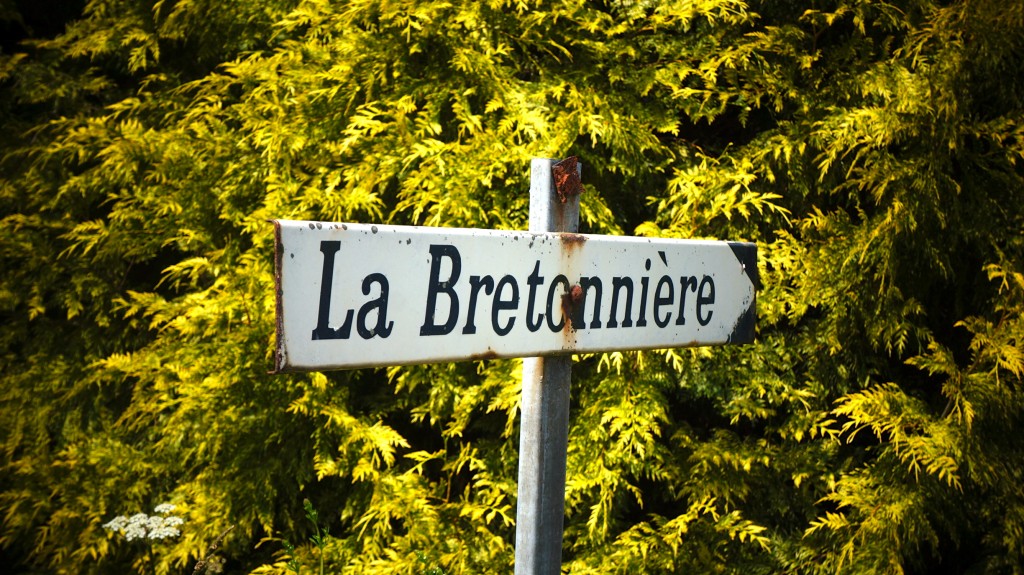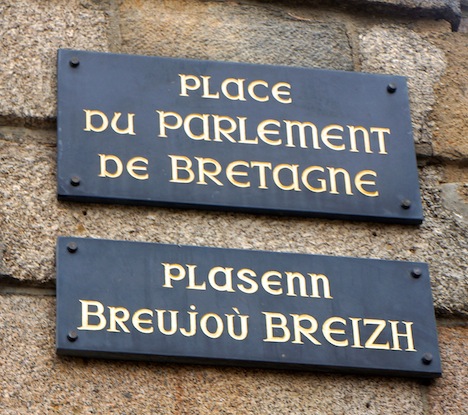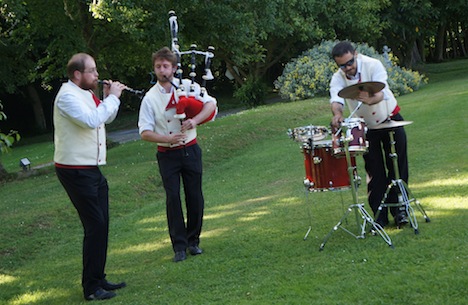I’ve spent much of the past week traveling through Bretagne (or ‘Breizh’ in the local Breton language) — the peninsula that juts out from northwestern France into the Atlantic Ocean, and I’ve spent some time thinking about regionalism in France and why Bretagne, with its Celtic roots, geographic isolation, historical independence and distinct language, isn’t more like Scotland or Catalonia politically. ![]()
![]()
With just over 3 million residents, the region of Bretagne is home to about 5% of France’s population, though the administrative region of Bretagne doesn’t include all of what was considered Bretagne historically — another 1 million people live in Loire-Atlantique, which is technically part of the Loire region despite its historical inclusion within wider Bretagne. Regardless of the current regional borders, Bretagne is a unique part of France, and its cultural heritage sets it apart as at least as unique as any other region of France, given that it was settled by Celtic migrants from the north who successfully rebuffed Vikings, Normans, Gauls and Franks for centuries in what, during the Middle Ages, was known as Armorica. Despite its independence, Bretagne increasingly became the subject of both English and French designs in the early half of the millennium, and the region was one of the chief prizes of the Hundred Years War between England and France in the 14th and 15th centuries, which finally settled France’s hold on Bretagne.
Moreover, Breton — and not French — was the dominant language spoken in the region through much of the 19th century. Despite the universal use of French today and a declining number of Breton speakers, around 200,000 native speakers remain, and Breton features prominently on many public signs in the region, especially as you go further west in Bretagne. (Another second language, Gallo, is used by around another 30,000 Breton residents).
Bretons, such as Jacques Cartier, dominated the earliest French efforts to explore and colonize the New World and, even in the 19th century, the region’s role in transatlantic shipping and trade meant that its ties with far-flung places like Newfoundland and Labrador were just as influential as the region’s ties to Paris. Cultural ties with other Celtic regions such as Wales, Scotland and Ireland have long overshadowed French cultural influences as well — Breton music has a distinct character and often features bagpipes not dissimilar to those found in other Celtic folk music traditions.
Furthermore, there’s been a resurgence in interest in Breton heritage and cultivation of Breton language in the past 30 years, even as the number of Breton speakers is set to decline over the next decade to just over 50,000. Its distinctive black-and-white flag, the Gwenn-ha-du, developed in the 1920s during a prior wave of Breton nationalism, flies throughout Bretagne much more prolifically than do other regional flags elsewhere in France.
But Bretagne is not a hotbed of separatist agitation like Catalonia or Basque Euskadi in Spain or like Québec in Canada. Nor does it especially have a history of autonomist politics similar to those throughout western Europe — Flanders in Belgium, Galicia in Spain, or northeastern Italy.
Celtic nations, in particular, have long agitated for greater political autonomy throughout western Europe. Scotland will hold a referendum on independence in September 2014, and both Scotland and Wales have routinely supported devolution of power within the United Kingdom. The move for independence in Ireland, another of Bretagne’s Celtic cousins, was perhaps the most successful European nationalist movement in the first half of the 20th century.
The region does have a regionalist party, the Union Démocratique Bretonne (the Breton Democratic Union, or the Unvaniezh Demokratel Breizh in Breton), but the party holds no seats in the Breton regional assembly, and in the most recent 2010 regional elections, it won just 4.29% of the vote. In the June 2012 parliamentary elections to the Assemblée nationale (National Assembly), the UDB’s Paul Molac won election, though technically as a member of France’s Green Party, which contested the elections in alliance with the Parti socialiste (PS, Socialist Party) of French president François Hollande.
If there’s any trend worth marking in Bretagne, it’s that the left has done increasingly well in Bretagne in recent years, to the point that Bretagne could even be considered a Socialist stronghold within France. Hollande defeated former president Nicolas Sarkozy in the region by a margin of 56% to 44% in the second round of the May 2012 presidential election and in 2007, though Ségolène Royal lost the presidency to Sarkozy nationwide, she won Bretagne in the second round by a margin of 53% to 47%. Traditionally, the nationalist, far-right Front national of Jean-Marie and Marine Le Pen have not succeeded to same degree in Bretagne as they have in other parts of France.
But Bretagne simply hasn’t boasted an incredibly strong politics of regionalism, despite several waves of Breton nationalism throughout the 20th century and the current revival of Breton linguistic and cultural heritage.
Why exactly is that the case?
As you might expect, there’s not a single magic answer, but four factors in particular go a long way in explaining why Bretagne hasn’t developed the same level of regionalist politics as, say, Scotland or Catalonia: the five-century duration of French control over Bretagne, the highly centralized nature of the French government, historical reasons rooted in the 20th century and, above all, the lack of an economic basis for asserting Breton independence.
Bretagne became part of France back in 1532 through the Edict of Union that resulted from the marriage of the duchess of Bretagne, Anne, to the French king at a time when the borders of modern-day France were fully coming into relief. The consolidation of the modern French polity predates much of the formation of today’s European nation-states — it precedes the 1831 independence of Belgium from the Netherlands as a nation-state in its own right by over 300 years, to say nothing of the Italian and German unification of the middle of the 19th century. But longevity doesn’t necessarily explain everything — the Act of Union that brought England and Scotland together in 1707 is almost as old, and Scottish residents will vote on independence at the end of 2014.
The longtime centralization of French government also helps explain the paucity of separatism, not only in Bretagne, but throughout the entire country, excepting perhaps the separatist movement on the island of Corsica. As long ago as the 17th century, Louis XIV was already consolidating the power of the French government within the monarchy in Paris and Versailles. Although the French Revolution extinguished the monarchy, and ensuing waves of Napoleonic empire, monarchic restoration and, finally, republicanism transformed the nature of French government, each new form of government culminated in an ever-more centralist government based in Paris. In almost every conceivable vector — economics, culture and art, government and regulation, education, transportation — Paris has long been at the center of French society. While GDP per capita in Bretagne is around €25,000, and per-capita GDP throughout the other regions of France averages between €22,000 and €28,000, per-capita GDP is around €45,000 in Île-de-France, the region where Paris lies.
Though French president François Mitterrand initiated a regional assembly and chief executive for each of France’s 22 mainland regions in 1986, regional assemblies are much weaker than, say, state legislatures in the United States or even the devolved parliaments in Wales, Scotland and Northern Ireland within the United Kingdom. Furthermore, 19th and 20th century French governments worked to eradicate the Breton language, and French administrators routinely found ways to marginalize the distinct Breton identity — until very recently, French law refused to allow parents to use traditional Breton names for their children and, even today, the use of French language is mandated by law in public schools and otherwise throughout the public sector. But that alone can’t necessarily explain it, either. After all, a strong central government in Madrid that at times tried to suppress regional culture and language hasn’t stopped the Catalan and Basque regionalist movements.
A more recent historical explanation is rooted in World War II, when the growing Breton nationalist movement sided actively with Nazi Germany, especially after the German occupation of France and the promulgation of the Vichy government in June 1940. Breton nationalists received financial support from Vichy during the Nazi occupation, which meant that much of the Breton nationalist agenda was discredited in the decades following World War II. The Parti National Breton (National Breton Party), which had formed in the 1930s as a separatist movement based on the model of Ireland’s Sinn Fein, was disbanded in 1944, and many of its leaders were tried and convicted as collaborators, further marginalizing the cause of Breton regionalism.
Perhaps the most salient explanation is economics. Although Bretagne’s economy suffered with the decline of shipping as a source of wealth in post-industrial France, Bretagne’s economy has made huge strides in the past two decades as tourism and other industries have surged. But while Bretagne’s no longer an economic backwater, it doesn’t have the kind of wealth that would make it an incredibly viable independent nation-state. Contrast that to Scotland, where the independence movement has grown in parallel with the development of North Sea oil wealth. Or contrast it to Catalonia, which has traditionally been the wealthy and productive engine of the Spanish economy, or the relatively more prosperous northern Italy, where the Liga Nord (Northern League) has been pushing for greater regional control for two decades. In Flanders, too, the push for ever-greater autonomy has come in parallel to Flemish economic dominance over Wallonia.
All of which means that you shouldn’t hold your breath waiting for a robust Breton nationalist movement anytime soon.
But in a world where the European Union has replaced many of the key elements of national governments and, especially if future EU treaties succeed in transferring further fiscal sovereignty from national capitals to Brussels, the case for Breton autonomy or even Breton independence will grow stronger. So while Bretagne isn’t likely to join Catalonia, Scotland and Flanders in the vanguard of European regionalist movements today, it’s not inconceivable to wonder if Bretagne might consider following suit if those regions ultimately gain independence.




